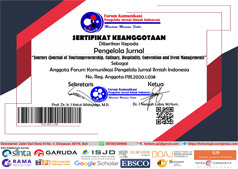Implementation Of Event Experience Design In Joyland Festival
Abstract
This article aims to examine how Joyland Festival implements the principles of event experience design, focusing on its purposeful, playful, and impactful strategies. Joyland Festival has distinguished itself as a leading example of music festival in Indonesia since 2011, aligning its programs with the principles of good event experience design to create immersive and impactful experiences for its diverse audience. Utilizing a five-phase analytical framework, this research explores the potential opportunities associated with creating memorable experiences in the context of events. It investigates the interplay between experience design as implemented by festival management and its perception by attendees and the broader community. Employing a qualitative research approach, the study reveals a strong alignment between the Joyland Festival’s practices and O'Loughlin’s framework of the Seven Elements of Good Event Experience Design: Purpose, Play, Awe, Flow, Shared Experience, Communitas, and Impact. By contributing to the growing body of literature and case studies in event experience design—an area predominantly focused on non-Indonesian contexts—this research provides valuable insights into the practical application of experience design in the Indonesian festival industry.
Copyright (c) 2024 Salsabila Ramadita

This work is licensed under a Creative Commons Attribution 4.0 International License.
















